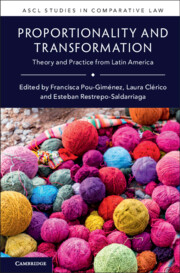Book contents
- Proportionality and Transformation
- Ascl Studies in Comparative Law
- Proportionality and Transformation
- Copyright page
- Contents
- Editors
- Contributors
- Acknowledgments
- Introduction
- Part I Proportionality and Processes of Constitutionalization
- Part II Proportionality in Social Rights and Equality-Based Adjudication
- Part III Proportionality, between Transformation and the Status Quo
- 10 Between Exception and Transition
- 11 Proportionality and State Ius Puniendi
- 12 Distributional Analysis as an Alternative to Proportionality Analysis in Judicial Decision-Making
- 13 Proportionality, Social Justice and Democracy
- 14 Unilateralism, Dialogue and False Necessity
- Epilogue
- Index
13 - Proportionality, Social Justice and Democracy
from Part III - Proportionality, between Transformation and the Status Quo
Published online by Cambridge University Press: 27 October 2022
- Proportionality and Transformation
- Ascl Studies in Comparative Law
- Proportionality and Transformation
- Copyright page
- Contents
- Editors
- Contributors
- Acknowledgments
- Introduction
- Part I Proportionality and Processes of Constitutionalization
- Part II Proportionality in Social Rights and Equality-Based Adjudication
- Part III Proportionality, between Transformation and the Status Quo
- 10 Between Exception and Transition
- 11 Proportionality and State Ius Puniendi
- 12 Distributional Analysis as an Alternative to Proportionality Analysis in Judicial Decision-Making
- 13 Proportionality, Social Justice and Democracy
- 14 Unilateralism, Dialogue and False Necessity
- Epilogue
- Index
Summary
The proportionality exam as developed by the German Constitutional Court expresses the idea that constitutional rights cannot be overruled neither by other constitutional rights nor public interests. Instead, colliding rights and public interests should be satisfied as factually and legally possible. The chapter defends that the integrated proportionality test, which analyzes suitability, necessity and proportionality in its narrow sense, while including a modulation of the intensity of the scrutiny, may become a powerful adjudication device. It allows for a nuanced implementation of the three subprinciples of the proportionality exam, enabling courts to level the ground for disadvantaged groups. To show the usefulness of the modulated exam in dealing with structural inequality in Latin America, two cases involving political rights decided by the Inter-American Court of Human Rights (Castañeda Gutman and Yatama v. Nicaragua) are examined.
- Type
- Chapter
- Information
- Proportionality and TransformationTheory and Practice from Latin America, pp. 278 - 288Publisher: Cambridge University PressPrint publication year: 2022



